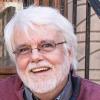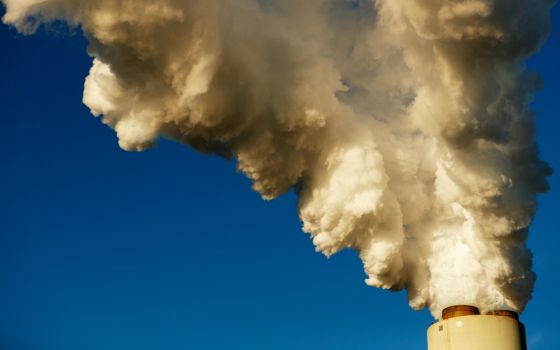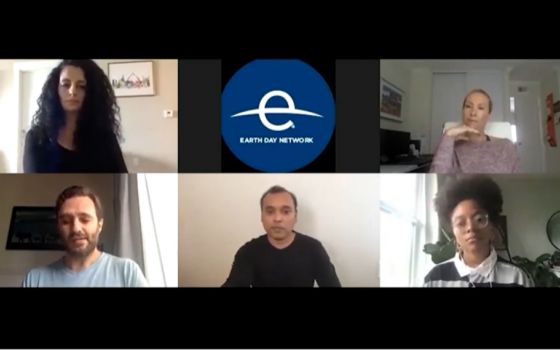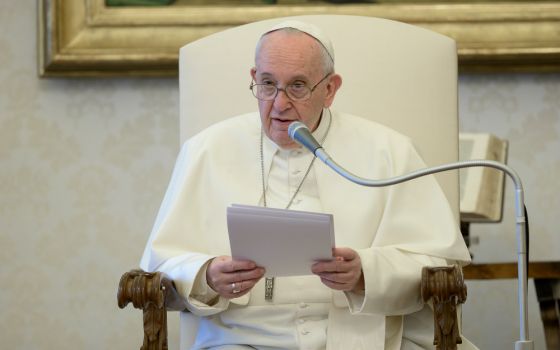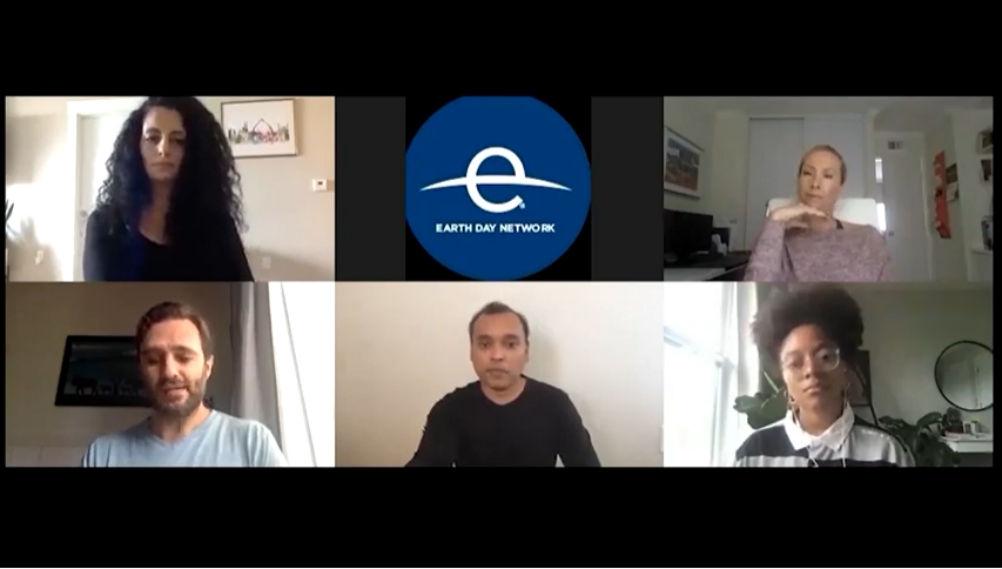
A group of panelists during the Earth Day Network livestream discuss how to adopt a vegan diet as part of the digital Earth Day 2020 events. The day celebrating environmental protection moved online in response to the COVID-19 pandemic. (Screenshot)
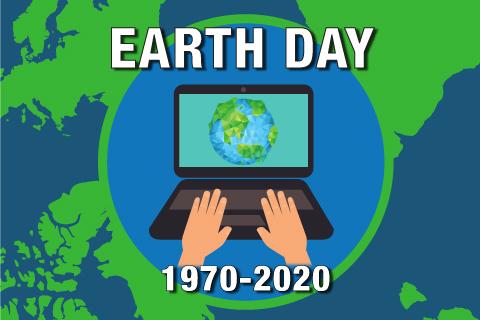
(NCR graphic/Jesse Remedios and Toni-Ann Ortiz)
On its 50th birthday, Earth Day went fully digital.
People across the world logged onto their computers to follow along with livestreams and join virtual meetings to take part in the annual day dedicated to protecting, preserving and appreciating our common planetary home.
The digital format was necessitated by the COVID-19 pandemic that, along with killing more than 182,000 people, has brought public life to a standstill throughout much of the world and has made the massive demonstrations that are synonymous with the environmental movement all but impossible.
Earth Day 2020 carried a theme of climate action, viewed even more critical this year with projections from scientists stating global greenhouse gas emissions must be nearly halved by the end of the decade in order to put the planet on pace to limit warming to 1.5 degrees Celsius (2.7 degrees Fahrenheit) by the end of the century.
Throughout the day, separate livestreams organized by the Earth Day Network and the U.S. Climate Strike Coalition featured a range of speakers and videos, with such offerings as reflections on climate change and the novel coronavirus, discussions on the Green New Deal, representation in the environmental movement, get-out-the-vote pushes, as well as cooking lessons and yoga sessions. There were appearances from celebrities, musicians, politicians and even Dr. Seuss' the Lorax.
The Earth Day Network livestream opened to peaceful meditative tones as video showed the sun rising behind planet Earth as the words "for the next 50 years ..." flashed on the screen. The first speakers of the day were faith leaders, a cohort of sheikhs, rabbis, an Australian aboriginal leader and more.
Their interfaith prayer organized by the Parliament of the World's Religions expressed mutual values of the shared responsibility of humans toward the Earth, noting that it does not belong to humans or the present generation but to the creator.
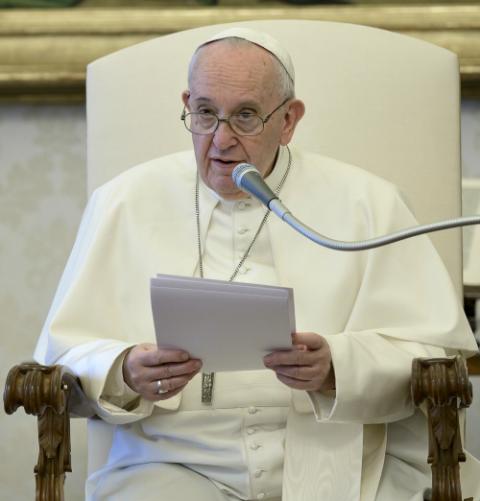
Pope Francis holds his weekly general audience April 22, 2020, in the papal library in the Apostolic Palace. Marking the celebration of Earth Day, the pope urged people to protect the Earth and its inhabitants. The audience talk was featured during the Earth Day Network livestream. (CNS/Vatican Media)
Salesian Fr. Joshtrom Isaac Kureethadam, coordinator for the ecology and creation sector of the Vatican Dicastery for Promoting Integral Human Development, quoted from Psalm 104: "Lord, send forth your spirit and renew the face of the earth."
"Let's ask God to renew once again, God's Earth once again, our fraternity once again, our mother Earth," he said.
In his Wednesday general audience at the Vatican, Pope Francis called the 50th Earth Day "an occasion for renewing our commitment to love and care for our common home and for the weaker members of our human family." Video of the pope's address was included as part of the Earth Day Live broadcast from the Earth Day Network.
Later in the day, it was announced that the all-virtual format would also be used during next month's Laudato Si' Week. The event, meant to celebrate the fifth anniversary of Pope Francis' encyclical "Laudato Si', on Care for Our Common Home," will forgo in-person activities the week of May 16-24 and encourage Catholics to take part in online trainings around eco-spirituality, sustainability, advocacy and community-building. The week will end with a global day of prayer.
The dicastery invited Catholics to use the week to launch "a year-long journey of transformation, as we grow through the crisis of the current moment by praying, reflecting, and preparing together for a better world to come tomorrow."
Reflecting the worldwide experience of Earth Day, the Global Catholic Climate Movement recommended a song created by its affiliate in Africa:
As with Earth Day, organizers of Laudato Si' Week originally envisioned large gatherings and events as a way to catalyze momentum for greater environmental protections not only within the Catholic Church, but in applying pressure on governments to do more on climate change later in the year at the United Nations COP 26 summit. That meeting has been postponed until 2021 because of the pandemic.
In a message on social media, U.N. climate chief Patricia Espinosa called for governments to use the recovery from coronavirus as an opportunity to shape the 21st-century economy as "clean, green, healthy, safe and more resilient."
"It's the world's chance to recover better," she added.
During the first Earth Day Network conversation, Denis Hayes, a co-founder of Earth Day in 1970, said the birth of the environmental movement began from a spirit of idealism and energy among the young who hadn't "yet learned what is impossible to do, and so they just go out and do it." He encouraged today's youth climate activists to follow suit.
"Nobody handed us a torch. We reached up and grabbed the torch. And I think it's time now for the next generation to answer that question," Hayes said.
In a statement for Earth Day, the Catholic Climate Covenant said, "Humanity is at a critical crossroad," citing agreement among scientists, policymakers and religious leaders that climate change is "an existential threat to God's creation." It said action in the next decade is paramount to avoid irreversible damage to critical ecosystems and devastation for the planet's most vulnerable communities.
"The world has never been so ready for the U.S. Catholic community to step up and take action on climate change," the Covenant said.
The Covenant's annual Earth Day program, revised this year with at-home activities in mind, was downloaded nearly 2,800 times as of Tuesday. That total surpassed the year-end downloads for its 2019 program in just a few months, with the Covenant attributing the greater interest in part to people confined at home.
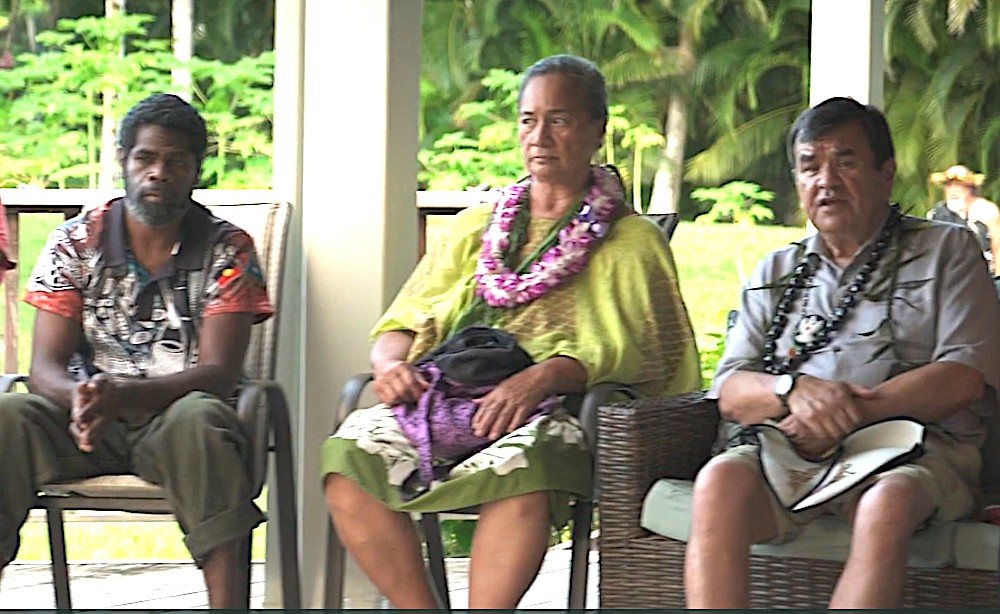
Indigenous elders from Alaska to Australia offered their views of what’s happening to the planet in a video released for Earth Day. (EarthBeat screengrab from video at www.wisdomweavers.world)
Russ Testa, head of the Justice, Peace and Integrity of Creation Directorate for the Holy Name Province of the Franciscan Friars in New York, oversaw the translation of the Earth Day program into Spanish. He told EarthBeat that a number of the parishes planned to use the Covenant program in May so they could join Wednesday's global Earth Day livestreams.
Speakers in the morning hours of the Earth Day Network feed struck an overwhelmingly positive tone. They stressed the interconnectedness of the environmental movement, and discussed possible solutions and personal commitments to action.
"We do not have any throwaway resources on this planet," Van Jones, a prominent American political commentator, said on the Earth Day Network livestream. He said that healing the planet and communities requires the same solution: a green economy that can lift people out of poverty.
"Every single thing that is needed to heal the Earth is a job for somebody," Jones said.
The broadcast highlighted the possibilities of sustainable jobs around the world through a series of videos from across the global south. Activists, organizers and directors of sustainability nonprofits in places such as Cambodia, Malaysia, India and Uganda were shown demanding action from their governments and pledging to take more personal action like ending their use of single-use plastics.
"Before you preach to others, take action yourself and then go out and influence your peers and community," said Kehkashan Basu, the 19-year-old founder of the Green Hope Foundation.
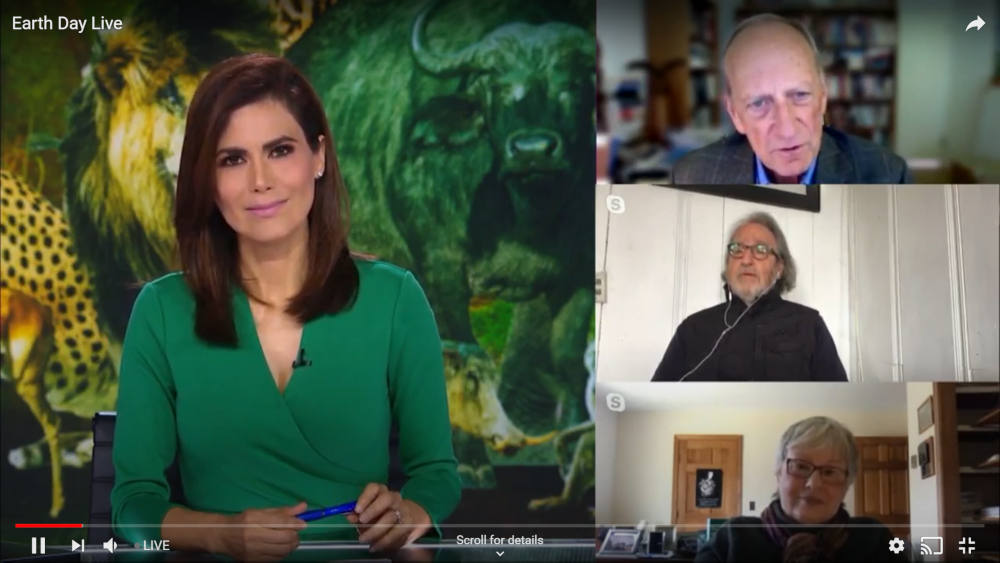
Denis Hayes, top right, co-founder of the first Earth Day, speaks during a panel discussion as part of the Earth Day Network livestream for Earth Day 2020. (Screenshot)
Ricardo Grassi, director of the citizen platform for UNESCO, said that telling the stories of people who have made personal lifestyle changes will be essential to "changing the narrative" so radical climate action seems feasible.
Sergio Costa, the Italian minister of the environment, expressed hope that global climate meetings, to be held in Glasgow, Scotland, will be able to resume by 2021 "to ensure participation from all because this is the point: the participation of everyone."
As it stands, the United States — the second largest greenhouse gas emitter in the world — is scheduled to officially leave the Paris Agreement in November.
Costa said Italy will host both a pre-COP meeting before Glasgow and a global youth meeting that will form a "youth declaration with official recommendations to be formally discussed at COP 26."
Outside the main livestream events, many groups planned their own virtual Earth Day gatherings.
Interfaith Power & Light hosted its Faith Climate Action Week online, and held a daily national climate prayer. The Rev. Susan Hendershot, Interfaith Power & Light president, led the Earth Day prayer, saying, in part, "We pray that the web of life may be mended through courageous actions to limit carbon emissions. We pray for right actions, for adaptation and mitigation to help our already suffering Earth community."
At Seattle University, there was a series of Earth Talks, including one with Hayes, whose Bullitt Foundation is located just blocks from campus.
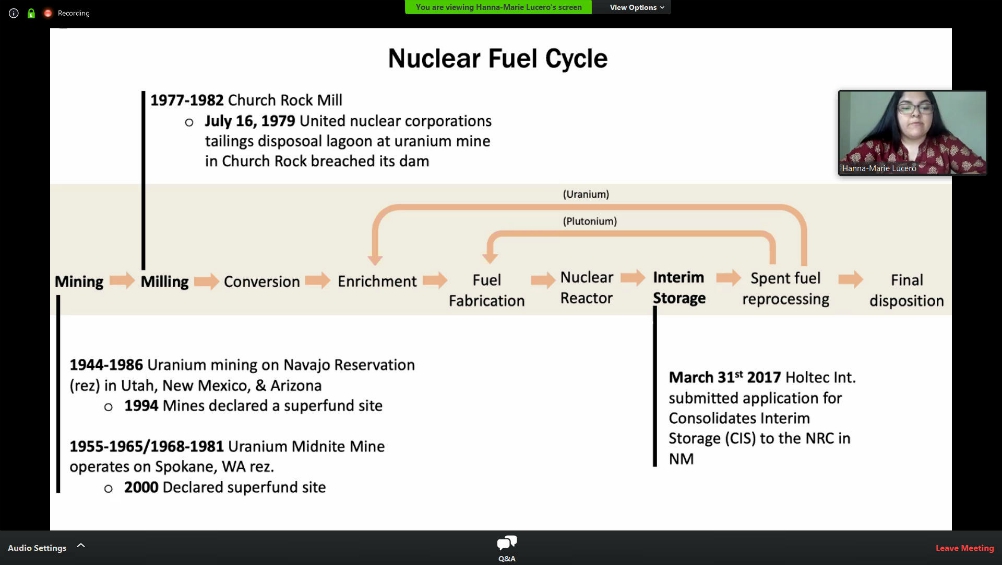
Hanna-Marie Lucero, a senior at Seattle University, presents on environmental racism in nuclear plants on indigenous lands as part of the Jesuit school's Earth Talks program for Earth Day 2020. (Screenshot)
The Zoom program, hosted by the Center for Environmental Justice and Sustainability, featured short presentations from university professors, students and community leaders on topics such as climate science, health and environmental justice in Seattle's Beacon Hill neighborhood, aquaponics on campus and sustainable business. Hanna-Marie Lucero, a student, presented on the health impacts and environmental racism present in nuclear energy development on indigenous lands.
Students who are engaged in fossil fuel divestment campaigns on their college campuses made plans to hold virtual climate strikes during classes. The 60 schools within the College Climate Coalition, including a number of Catholic campuses, created backgrounds to display saying "climate strike" and "Earth Day" and pointing classmates to websites where they can learn more. The students will lead a discussion on climate action in higher education Thursday during Earth Day Live hosted by the U.S. Climate Strike Coalition.
Kyle Rosenthal, a junior at Boston College, said that the recent tanking of the global oil market amid the pandemic, with prices momentarily going negative this week, only strengthens their argument that fossil fuels are a risky investment for university endowments.
"It would make sense to not be owning these stocks right now, and we're going to do our best to really push that argument," Rosenthal said.
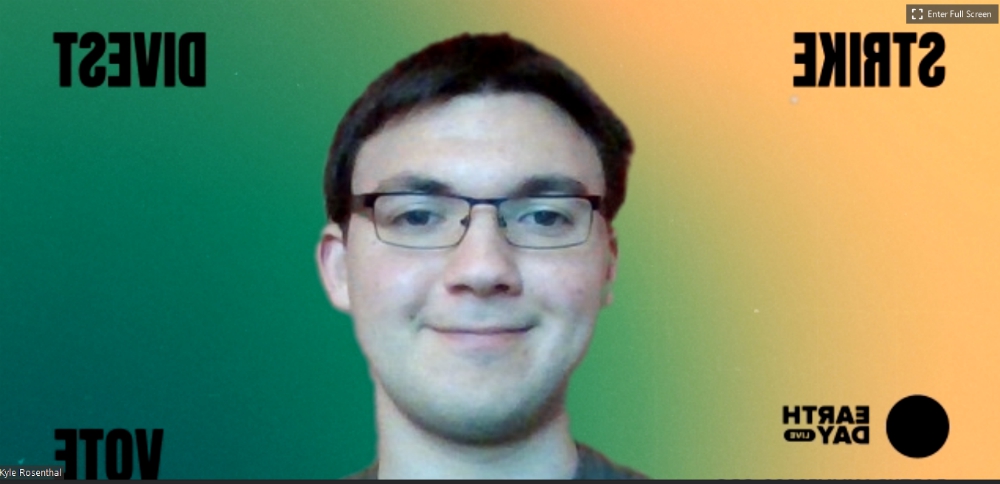
Kyle Rosenthal, a junior at Boston College, appears during a Zoom class session with a background promoting climate strikes and fossil fuel divestment on Earth Day 2020. (Courtesy of Kyle Rosenthal)
At Salpointe Catholic High School in Tucson, Arizona, teacher Nicholas Sitzman's sophomore history class shared experiences of Earth Days past during a Google Meet session. Students were asked to interview their parents and grandparents about how they marked the day when they were kids. Many said they remembered picking up trash, planting trees, walking to school or not watering their lawn.
Back at the Earth Day livestream hosted by the U.S. Climate Strike Coalition, along with the Stop the Money Pipeline Coalition, the 72-hour broadcast geared toward youth activists, the event was filled with panels and discussions aimed at providing the activists with tools to combat the climate crisis, placing particular emphasis on raising the profile of marginalized communities.
Dozens of youth activists from across the country called in from home to share their thoughts and best practices for organizing with their fellow students. Those watching along chatted with each other in the comments section, cheering on the presenters and sharing helpful articles or ideas of their own.
In a panel discussion on climate activists of color, the group of teenagers questioned why the media does not cover more climate activists who look like them. Ignoring people of color, they said, hurts the movement and reinforces the status quo.
"If the media isn't working with us, they're part of the problem," said Cynthia Leung, a high school student from Brooklyn.
Advertisement
Following some musical performances and a magician, a group of students from Boise, Idaho, gave a presentation on organizing in a conservative state.
"You can do all the education and research around the climate crisis, but it becomes real when you are actively fighting in the streets for your future," said Petra Hoffman, a high school freshman.
When Sylvia Earle, a renowned marine biologist, was asked if she thinks we are closer to protecting the planet than we were 50 years ago during the first Earth Day, she responded with an emphatic "Yes." Earle pointed to the unique historical moment we are currently in: Fifty years ago, we did not have the information to act, and in 50 years, it will be too late to act.
"And I have confidence in the kids. I do. I listen to them," said the 84-year-old scientist. "We need to pull it together and make the next 50 years the best time in humankind.
In a prerecorded video message, Rhiana Gunn-Wright, policy lead for the Green New Deal, confronted notions that discount young people as unready to lead a political movement. Although young people have raised the profile of the urgency for climate action, Gunn-Wright said that many adults still dismiss young people from the decision-making process.
"Just because people are young, it doesn't mean they aren't studying hard, it doesn't mean they don't understand the issues, and it doesn't mean that they have nothing to contribute," she said.
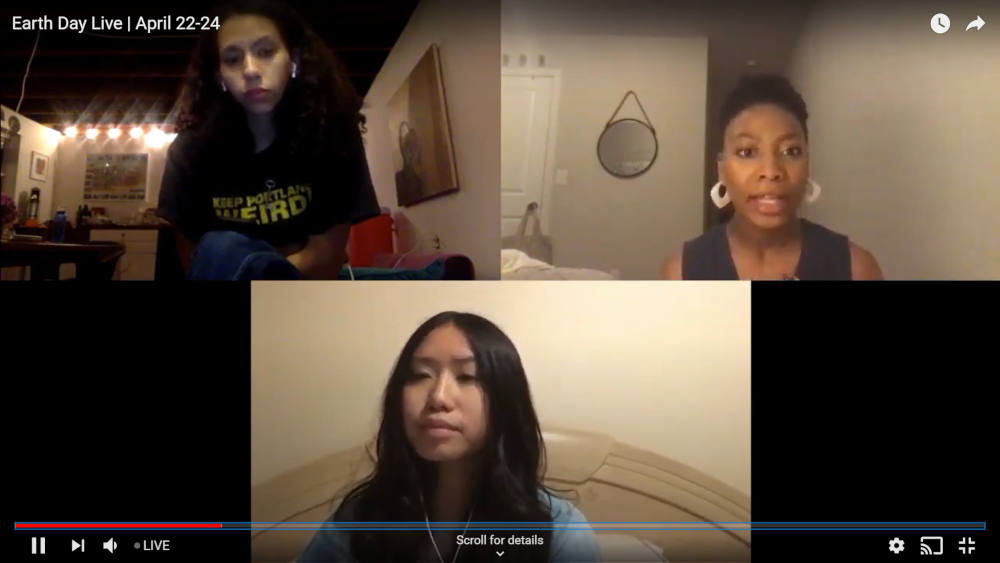
From left, Fiona Jarvis, Cynthia Leung and Krissy Oliver-Mays, three youth activists with Extinction Rebellion, discuss just representation in the media as part of the Future Coalition Earth Day broadcast. (Screenshot)
"[Movements] begin with the telling of untold stories," said Rev. Liz Theoharis, co-chair of the Poor People's Campaign. "Movements begin when you shift the narrative."
For Theoharis, the harmful narratives that currently plague society are distorted ones that blame poor people for their problems or that claim there aren't enough resources to go around. In her segment, "Changing the Narrative: A Conversation on Activism, Climate Change, and Frontline Communities," Theoharis and her co-chair, the Rev. William Barber, emphasized the importance of recognizing the interconnectedness of social issues and their compounding effects on poor communities.
If you look at the "most marginalized and poorest communities, whether it's the Apache sacred lands of Oak Flat in Arizona or Cancer Alley in Louisiana," then you can't just talk about racism or poverty," Theoharis said. "And if you're interested in saving the Earth then we have to actually confront racism, poverty, ecological devastation and a militarized economy."
"We better stand together and fight together and change this country together, because in fact, all these issues have an impact on what we all care about," said Barber.
[Brian Roewe (broewe@ncronline.org) is an NCR staff writer. Jesse Remedios (jremedios@ncronline.org) is a staff writer with NCR's EarthBeat. Bill Mitchell (bmitchell@ncronline.org) is editor of EarthBeat.]


